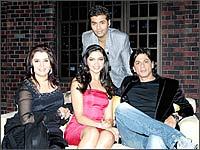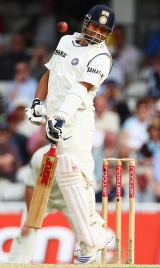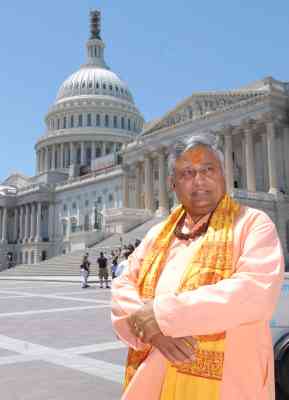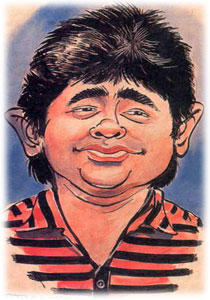I was reading the other day that Aishwarya Rai, now busy being the 'pink' in the Pink Panther franchise's next episode, was feeling particularly lonely (She must be missing all those sycophants who cluster around stars on a Bollywood set, maybe?).
So, lo, hubby Abhishek and saas Jaya Bachchan rushed post-haste to be with the poor lonely darling, thus providing us with an invaluable example of what 'family values' is all about (You never know, Karan Johar just might use this as the peg for his next film, if he can think of a title in four words each of which begins with K).
Here's the funny thing, though -- this is a family that, loudly and often, values its privacy. The senior Bachchan not so long ago pleaded with the media to stop 'hounding' the family. So where did this story, and similar other recent tidbits about life chez the Bachchans, come from?
Could it be an enterprising reporter keeping vigil at Sahar International, waiting to see which star family is flying off where, and for why? Or could it be inspired plants by the family seeking to give its golden hue another touch of the gilding brush?
You tell me. Meanwhile, let's get off this boring topic, and move to an infuriating one.
During the 'word association' segment of one of those 'rapid fire' things on Koffee With Karan not so long ago the host tossed this word out: Critics.
Pat came the answer, from guest Farah Khan: 'Retards'.
I had always imagined it was impossible for a person to be asinine and arrogant at the same time, until I saw that segment; the guffaws that greeted the answer only underlined the enormity of the egoistic bubble Bollywood's movers and shakers have enclosed themselves in.
'Retard' is not a word you would use today in polite conversation even if you were in fact referring to someone who was mentally challenged; to use that word to describe a sub-group of journalists who are doing their job the best they know how merely demonstrates Khan's lack of class and breeding.
 Tangentially, I was much taken by Shah Rukh Khan's more nuanced response: Critics have made me who and what I am, and therefore I think it is fair to take the good with the bad, he said, and with that statement, he in my mind wiped out the negative vibes of a decade of acting that was mostly so hammy it belongs between two slices of bread.
Tangentially, I was much taken by Shah Rukh Khan's more nuanced response: Critics have made me who and what I am, and therefore I think it is fair to take the good with the bad, he said, and with that statement, he in my mind wiped out the negative vibes of a decade of acting that was mostly so hammy it belongs between two slices of bread.
Back to Farah Khan and her ilk (when Karan Johar put together a group of hot shot directors and the subject of critics came up, similar sentiments were expressed by two A-list helmers), who think it is uber cool to look down their politically incorrect noses at a group of people who, week in and Friday out, sit in darkened movie theatres, ignoring the growing pain in the butt, watching the week's release and most times, trying to say in 800 polite words what the average fan would say in two:
'This sucks!'
(In passing, any and all of these directors will happily take a review that reads 'This is the absolutely worst movie of the year', and reproduce it on their publicity posters as 'Movie of the year: Media!!!'; apparently even the best of directors need these 'retards' to con their audiences).
More recently, a columnist for a Mumbai tabloid, writing against the backdrop of the universal panning Ram Gopal Varma attracted for his Aaargh!, suggested in all seriousness that critics should enroll for a three-year course in film, before putting finger to keyboard.
Apparently, he was inspired to this effort after Jaya Bachchan called him to say critics were being unnecessarily brutal about the film -- never mind that the lady had, from the time Ramu announced his project, been sniping at it endlessly and had said, even in the run up to the release, that Sholay should never be remade.
Significantly, the columnist doesn't mention that maybe Bollywood's directors, who spend unnumbered millions turning out, for the most part, turkeys, could benefit from such a course too.
So, to the question: are critics really what Farah Khan said they were?
You likely have your answer; mine is no, not really -- they are merely, for the most part, intellectually lazy.
Week after week, they paint their pieces by the numbers: Describe plotline; say a few polite words about the male and female leads (or impolite words, if said stars are not A-listers); toss off a few adjectives about cinematography and music ('evocative' is the adjective du jour -- 'evocative cinematography' sounds very impressive, and tells you nothing at all) and 'either rag or fawn on the director, depending on whether he is part of that select group that can do no wrong or not.
If you want to sound particularly erudite, you toss in something on the lines of 'The editing was a touch too jerky in places, and could have been tighter' which is as insightful as my horoscope for the day, which says 'You will be confronted by much work (No shit?!), but since Mars is in Venus, you will bring your natural abilities to doing it well.'
It's a great gig if you get it; you get free tickets for previews, you get wined and dined by the movie-makers, some even get envelopes that help pay off another installment of that 'home loan' and, since an award in this category has to be given out annually and there are only a dozen or so critics around, someday soon you could end up with a 'Best Film Critic' national award on your mantelpiece.
And then there are a few critics, from the younger lot, who bring sense, and a measure of cinematic sensibility, to their writing; guys like Mayank Shekhar, Baradwaj Rangan (who won the best critic award this year and actually deserved it, unlike some names I could mention from the past but won't), and Rediff's Raja Sen the only critic I know who has an 'I hate Raja Sen' community on Orkut. (Apparently this community is so large, and growing at such frantic pace, that it is helping Orkut stave off stiff competition from Facebook for the most number of enrolled Indians).
 I don't agree with everything these guys write, but when it comes to opinion, each is permitted his own. For instance, I spent part of this weekend watching, with considerable pain, a Memento rip-off by Tamil director Murugadas, called Gajini.
I don't agree with everything these guys write, but when it comes to opinion, each is permitted his own. For instance, I spent part of this weekend watching, with considerable pain, a Memento rip-off by Tamil director Murugadas, called Gajini.
When it was released the critics raved, the masses loved it, and it went on to become an enormous hit; Aamir Khan, our very own Robert de Niro wannabe, is currently busy making the Hindi version with the same director. And -- at risk of being flamed -- I absolutely hated the film.
Movies are largely a matter of personal taste. So, no, I don't agree with every review these guys write, and likely you won't either -- but the point is, their writings are informed by a sense of cinema's aesthetic; an appreciation of the finer points of the craft.
That is all you should reasonably expect from a critic; that, plus an ability to constructively argue their opinions through.
Which brings me to why I called critics -- barring a few honorable exceptions -- lazy: they don't read.
A good friend, who happens to be one of the top technicians in the business, and I were once arguing about a film he had worked on. At one point, he suggested that before I started tossing off criticism on camera work, which is what I was inundating him with at the time, I should take the trouble to read Daniel Arijon's The Grammar of the Film Language.
He couriered me his personal copy, enhanced with considerable marginal notes. I have since bought my own copy -- it is a brilliant guide to the many techniques of visual narration.
Among dozens of other books I read since then -- books that created a greater awareness of, and appreciation for, the magic of movies -- I'd recommend Timothy Corrigan's A Short Guide to Writing About Film; Syd Field's Screenplay and, in fact, all the books by him including the latest, Going to the Movies; and Story, by the iconic Robert McKee (I once attended one day of his three-day seminar on the art of storytelling; it was both magical, and brutal but more on that another day).
I don't subscribe to the view of the columnist cited earlier, that critics need to have taken three-year courses in film. But I do believe that critics owe it to themselves, and to the public, to better inform themselves about the nuances of the art form they bang on about each weekend.
I believe they need to work on developing a cinematic sensibility of their own and, with it, an articulate, intelligent voice.
And if they can do that, the rewards are enormous.
You know those lists Forbes magazine constantly puts out, like World's Richest, World's Billionaires and such? Recently, the magazine on the basis of an exhaustive poll put out the list of the United States' Top Ten Pundits.
The list is dominated by political opinion makers ranging from Bill Maher and Al Franken on the left to Bill O'Reilly on the right, Rosie O'Donnell on the lunatic fringe, and Geraldo Rivera in between. Greta Van Santeran, the legal pundit who deserves to be known for her coverage of the OJ Simpson trial but is more famed for the plastic surgery she went in for after landing a gig with Fox News; Lou Dobbs, the business guru who these last few years has concentrated on bagging outsourcing; and former basketball star turned sports pundit Bill Walton all earn high praise.
Here, though, is the surprise: movie critic Roger Ebert of the Chicago Sun-Times is the astonishing entry at number one; Leonard Matlin, whose movie guides you are constantly tripping over on the pavements outside Churchgate station, also makes the list at number seven.
Think on that: a movie reviewer polling tops in a list of America's most influential opinion makers, beating out an A-list of political commentators in a country where political punditry dominates, even monopolizes, the public consciousness.







 Tangentially, I was much taken by Shah Rukh Khan's more nuanced response: Critics have made me who and what I am, and therefore I think it is fair to take the good with the bad, he said, and with that statement, he in my mind wiped out the negative vibes of a decade of acting that was mostly so hammy it belongs between two slices of bread.
Tangentially, I was much taken by Shah Rukh Khan's more nuanced response: Critics have made me who and what I am, and therefore I think it is fair to take the good with the bad, he said, and with that statement, he in my mind wiped out the negative vibes of a decade of acting that was mostly so hammy it belongs between two slices of bread. I don't agree with everything these guys write, but when it comes to opinion, each is permitted his own. For instance, I spent part of this weekend watching, with considerable pain, a Memento rip-off by Tamil director Murugadas, called Gajini.
I don't agree with everything these guys write, but when it comes to opinion, each is permitted his own. For instance, I spent part of this weekend watching, with considerable pain, a Memento rip-off by Tamil director Murugadas, called Gajini. 
 History was created in the United States Senate at 9.30 am on Thursday, when Rajan Zed, the Hindu chaplain of the Indian Association of Northern Nevada, opened the Senate with a Hindu prayer.
History was created in the United States Senate at 9.30 am on Thursday, when Rajan Zed, the Hindu chaplain of the Indian Association of Northern Nevada, opened the Senate with a Hindu prayer.


